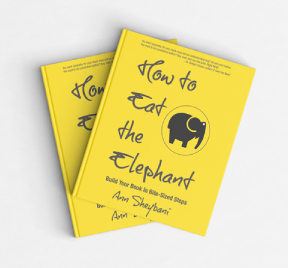Writing
See if you recognize your sorry excuse
October 28, 2019
Any time you switch up your routine or form new habits–which is pretty much what you’ve got to do if you want to have something you don’t have now–you’ve got to overcome all sorts of obstacles that spring up in your path. It’s all well and good when you’re pumped up and motivated, when you see what you want ever so clearly. It’s another thing entirely when the autopilot stuff kicks in six weeks down the road. When motivation leaves you in the lurch and heads south with your college kid for spring break.
It’s so much harder to stay on track, particularly when you’re not feelin’ it, if you actually have to think. And when it gets hard, you’ll start looking for an easy way out. You’ll find yourself falling back into your old routines.
If you’ve ever launched into a book project, you know EXACTLY what I mean. If you’ve ever wanted to drop some weight, you know EXACTLY what I mean as well.
According to Gretchen Rubin, author of The Happiness Project, we must be constantly vigilant of our propensity to look for loopholes whenever we’re attempting to form and keep new habits. (And writing, for many, is a brand new habit.) We look for all sorts of justifications that will excuse us from keeping this particular habit in this particular situation.
If you’re anything like me, you’ll recognize your sad, sorry self.
There are many kinds of loopholes:
The False Choice Loophole, in which we pose two choices or activities in opposition, as though we have to make an either/or decision when in fact the two aren’t necessarily in conflict. I can either enjoy life to the fullest, for example, or spend six days a week chained to my typewriter. Are these really the only two alternatives? For all-or-nothing people like me, we can be blind to the other 57 options.
The Moral Licensing Loophole. We give ourselves permission to do something “bad” because we’ve been so “good.” We reason that we’ve earned it or deserve it, or that some good behavior has offset something bad. I can eat a whole pizza, I like to believe, because I ran 18 miles. I’m here to tell you that, as unfair as this may seem, the one does not cancel out the other, and I end up paying the price in the form of lard.
The Tomorrow Loophole. Now doesn’t matter much, because we’re going to follow good habits tomorrow. It doesn’t matter what I eat now, I’ve told myself on the outset of every diet, because the diet starts tomorrow. Except, of course, tomorrow never comes.
The Lack of Control Loophole. One of my personal favorites. We argue that we don’t have control over the situation. Those special circumstances have forced us to break a habit. Someone showed up unannounced to my house, what kind of animal would continue writing with a guest staring them in the face?
The Fake Self-Actualiztion Loophole. Comes in the disguise of an embrace of life or an acceptance of self, so that the failure to pursue a habit seems life affirming, almost spiritual. I love life too much to deprive myself of this gallon of Jack Daniels. I accept my ass as it is, so pass the spaghetti and meatballs.
Concern For Others Loophole. We tell ourselves that we’re acting out of consideration for others and making generous, unselfish decisions. Or, more strategically, we decide we must do something in order to fit in to a social situation. I don’t want to make others feel uncomfortable by stealing away for an hour or two to finish the chapter I’ve been working on.
The Questionable Assumption Loophole. Consciously or unconsciously, we make assumptions that influence our habits, and often, not for the better. I can’t workout if I’ve already showered. Or I can’t start working until my office is clean. I can’t start something serious because I have to go somewhere in an hour. As we coaches are fond of saying, “Is that true?”
This Doesn’t Count Loophole. We tell ourselves that for some reason, this circumstance doesn’t count, but in fact, while we can always mindfully choose to make an exception to our habits, there are no magical freebies. Everything counts. Nothing stays in Vegas.
Apparently Irrelevant Decisions. When it comes to keeping our good habits, instead of fleeing temptation, we often arrange to succumb. We make a chain of seemingly insignificant decisions that allow us to covertly engineer the very circumstances that we’ll find irresistible. I’ll just check my email quickly before I get to this chapter…oops I don’t have time to get to that chapter after all. I’ll just slip into Dunkin’ Donuts for that coffee… damn those crullers look good.
The One Coin Loophole. Often, when we consider our actions, it’s clear that any one instance of an action is almost meaningless, yet, at the same time, a sum of those actions is very meaningful. True, any one writing session is inconsequential, but the habit of showing up for those writing sessions is invaluable. Pointing to the one coin (the one action) is a way to deny a conflict between our values. Eating one bag of M&M’s is an insignificant act. But when we consider the accumulated cost of the chocolate habit, the conflict looks different.
Here’s the thing, it’s not a question of IF you’ll discover these loopholes, it’s a matter of WHEN. Looking for a way out of discomfort and change is human. The sooner you catch yourself playing these head games with yourself, the sooner you can get back on track and create the kind of life you deserve.



